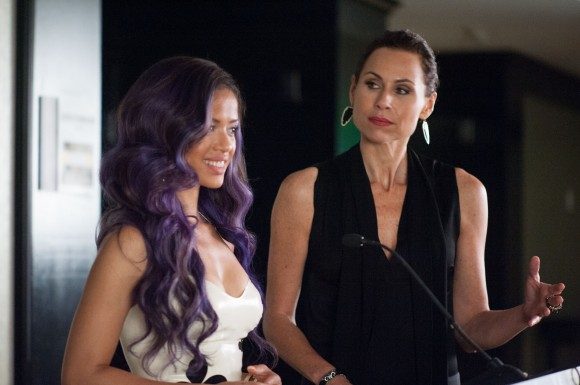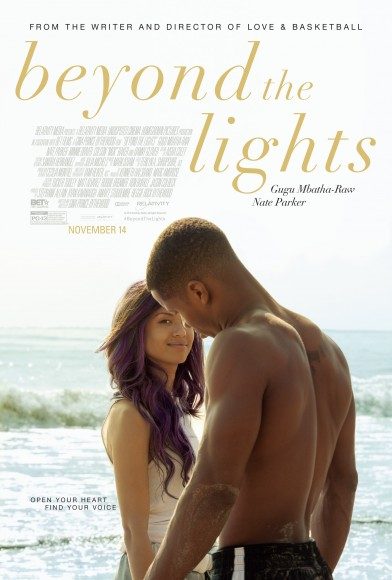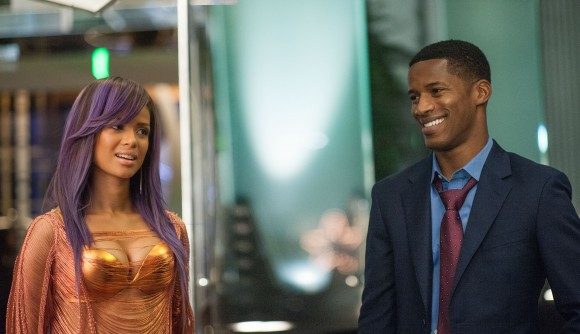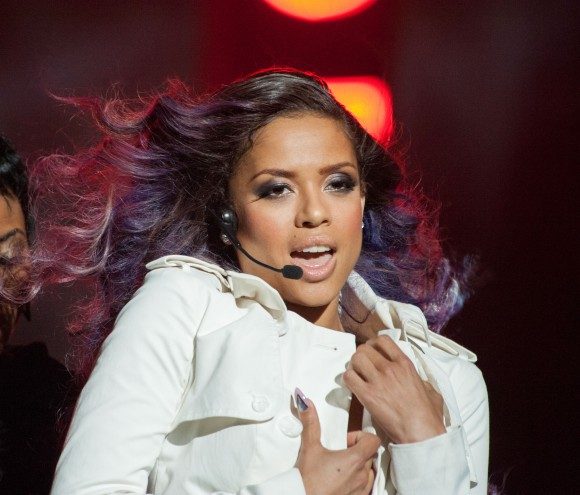Sometimes when you see and review a lot of movies, it’s easy to be dismissive of films which you realize pretty early on aren’t going to be very good. And it’s true that Beyond the Lights isn’t very good, mostly a by-the-books romantic drama about a depressive pop star and a “boy scout” cop. That is the inescapable majority of the movie. But to focus exclusively on those shortcomings is to ignore how close this movie came to being an extraordinarily powerful piece of art.

“Schlock romance” and “indispensible art” aren’t normally descriptors you find in proximity to one another, but in this case it’s oddly part of the movie’s oeuvre. Half of the couple we focus on is a young pop star called Noni (Gugu Mbatha-Raw, hot on the heels of a well-received leading performance in Belle). Noni is best described as an amalgamation of Katy Perry and Nicki Minaj with a dash of Miley Cyrus thrown in. She’s an R&B star on the rise, already famous for her guest performances on several tracks by a popular rapper. The lyrics, not to mention her performances in the videos for these songs, are incredibly sexualized, purposefully trying to be emblematic of the R&B music industry at large while also pushing just far enough that we know Noni’s character is probably intended as a farce, though she’s played straight for effect.
That’s a potent starting place right there, and when you add in that Noni’s mother (Minnie Driver), who is also now her manager, has aggressively pushed her into this world, you’ve got the elevator pitch for a compelling movie, effectively without half of what actually shows up on screen. Noni’s character arc is about self-actualization as an artist, a willingness to go away from what’s lucrative but empty and risk fame, fortune, and security striving for artistic and personal fulfillment. That’s a very compelling bit of characterization that’s not particularly well served by a plot that’s predominantly about the struggles of a budding romantic relationship.
Which brings us to Kaz (Nate Parker), an upstanding young police officer whose dreams of a life in politics are just beginning to be realized when he’s thrust into Noni’s personal life. Kaz is at once the most believable and most boring part of the entire film. He’s an everyman, but one who’s also, for the most part, the version of ourselves that most of us want to be. He’s strong, courageous, and morally upright. There’s some intrigue in the idea that his new romance with Noni could jeopardize his political career, but mostly he feels like a hang-on to a more important narrative. In part, although Parker looks a bit like a young Denzel Washington, he’s got none Washington’s range. Thus, there’s very little to argue that Kaz ought to be anything more than a supporting character, but he’s thrust into a second lead part.
In making sure that Kaz is every bit as important as Noni, the film also forces out a significant portion of what, as I already mentioned, is the most compelling part of the picture. The relationship between Kaz and Noni goes through all the expected phases without having any of the realism or believability that grounds the better examples of the genre. Fights come at expected moments for the sole purpose of introducing tension, the main characters fall madly in love without ever really getting to know each other, a jealous ex catalyzes a climactic event. You know the drill. And in consequence, most of that rich thematic tapestry of the sexualization of women in entertainment, perhaps especially in R&B, goes unseen. It’s a background issue at best, and one the film never seems concerned with confronting head-on. When Noni finally does try to do something about the way she’s portrayed to the public, it’s in the context of throwing off the controlling personality of her mother, not in the context of calling out the industry that made her a gyrating plaything for the male gaze.
The Verdict: 2 out of 5
It’s painful to see a movie sit on such a gold mine and do nothing about it. I may be slightly overrating Beyond the Lights here, but the basic idea of examining the culture of modern pop music through the experience of its adopted poster child is so compelling, and at times so close at hand, that I can’t help but appreciate what almost was. Unfortunately, the film contents itself by featuring an unremarkable and utterly predictable romance instead of something more daring, undermining its own theme while also failing to showcase much quality in the telling of the story it does choose.



